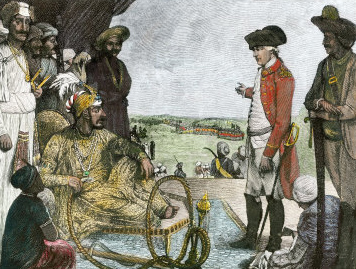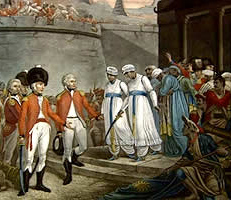- HubPages»
- Education and Science»
- History & Archaeology»
- History of Asia
Imperialism in India

The decline of the Mughal empire in India gave the British and the French, who had come to trade, an opportunity to conquer India. The English East India Company, formed in 1600, was victorious in its conflict with France, which ended in 1763. Beginning with Bengal, almost the entire country came under the rule of the English East India Company. After the Revolt of 1857, the British government took over direct control of India. Many princely states survived but they were free more in name than in fact. Britain's conquest of India was complete.
The conflict between the English East India Company and the French was over establishing a monopoly of trade. After the English company gained control, the country's vast resources fell into its hands. There was no longer any need to bring money from England to buy Indian goods. These were purchased with the money made from British conquests in India and sold in England and Europe. Fortunes were made by the officers of the Company, India was known as the brightest jewel of the British empire. With the coming of the Industrial Revolution in England, British goods poured into this country. This ruined Indian handicraft industries. Millions of pounds were drained out of India to England in the form of profits and as payment to the British government as direct tribute and Home Charges. India's interests were subordinated more and more to British interests. In 1877, the British queen took the title 'Empress of India', like the one used earlier by the Mughals.
The British conquest led to many changes in the Indian social and economic life. To extend Indian markets for British goods and to make use of India's natural resources, railway construction was started on a large scale. British rulers gave special privileges to their own planters, and within a short time a number of tea, coffee and indigo plantations grew up. In 1883, all import and export duties were waived. Indian resources, both human and material, were used to promote the interests of British imperialism in China, Central Asia and Africa. To prevent opposition from the Indian people, the British imposed laws to stifle the expression of public opinion. They excluded Indians from responsible positions in government, and discriminated against them in other institutions and in social life.

British rule in India : A Boon or a Bane
Early European administrators and historians sought to justify the British conquest of India by declaring 18th century as a Dark Age in the history of India, when the Indian social system was tainted by evils of caste, child marriage and widow burning, when Indian economy was all in stagnation and Indian political situation presented the picture of chaos, confusing and political instability. This European image of unchanging India and static Indian civilization persisted in English writings. The thrust of British argument was that India needed reforming education, good administration and long spell of British rule.

Another view unleashed by British administrators and particularly directed at the newly-emerged middle class English educated Indian intelligentsia was the Blessings of British rule in India. Britain took upon itself the providential mandate of civilizing the uncivilized population of the world. The Whiteman's Burden carried by Englishmen was a recurrent theme in the writings of British poets, British scholars and politician- administrators. The theme of modernization of India under the aegis of British rule is still finding supporters in the Anglo-American universities. Many Indian scholars and some European writers stress the exploitative features of British rule, of infinite and increasing misery of Indian people and of aborted modernization under British colonial rule.

Also See: Theory of Drain of Wealth
- Drain of Wealth Theory
Continuous flow of wealth from one nation to the other without any adequate returns in the form of either cash or service or material is Drain of Wealth. Dadabhai Nauroji's Theory of Drain of Wealth and Other comments.
Invasions into India
- Alexander invasion of India
Under the leadership of Alexander of Macedonia the Greeks finally destroyed the Iranian empire. From Iran he marched to India, obviously attracted by its great wealth. - Arabs invasion of India
During 636-37 A.D. during the reign of Caliph of Omar, Arabs launched naval expeditions to conquer western coast, but were repulsed at Thane near Trambay. - Nadir Shah invasion of India
Nadir Shah (Nadir Quli), so ambitious from his childhood sought extension of his dominions. Nadir Quli became the ruler of the Persia and assumed the title Nadir Shah. Nadir Shah invaded India... - Ahmed Shah Abdali invasion of India
Ahmed Shah Abdali invaded India five times. The glory of Marathas in India has come to an end with his invasion. Anarchy was created all around in the Mughal Empire. Abdali appointed his men as in-charge of the newly acquired provinces.








